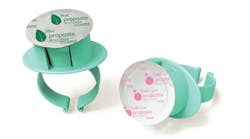Dear RDH:
I want to share my experience in having carpal tunnel syndrome surgery with a new endoscopic technique.
I developed swelling and pain in my left wrist at first. This trauma persisted for a month. I made an appointment with my physician, and she thought that perhaps it was arthritis. I had X-rays on my left wrist, which revealed within normal limits. This went on for a few more months, and the pain moved into my forearm and elbow. I started taking naxproxen on a daily basis to make it through the day, but I worried about the side effects. The pain in my right hand started with discomfort and soon swelling developed.
A few weeks later I noticed numbness and tingling almost overnight. I knew then that carpal tunnel syndrome had surfaced. I had an EMG test done by a neurologist, and he confirmed that I had CTS in both hands. I consulted with a friend who suggested that I look into the Brown Hand Center.
The Brown Hand Center performed an endoscopic procedure on both of my hands at the same time under general anesthesia — two small incisions at the wrist and palm of the hand and no stitiches. The dressing was on for seven days. My pain is essentially gone and I have not taken pain medication since I left the center.
Seven days later, the dressings came off. I took an active role in the rehabilitation of my hands. If I had had traditional CTS surgery, the post-op would have been a painful and lengthy recovery and perhaps subject to infection. I have been working in periodontal offices for 23 years as a dental hygienist. I returned to work in three weeks.
The Brown Hand Center gave me my life back. They have highly specialized skilled doctors. Michael Fitzmaurice, MD, performed the surgery on me on Feb. 21. The center is located at the Desert Ridge Medical Campus in Phoenix.
Florine Marcell, RDH
Wickenburg, Arizona
Dear RDH,
I am an RDH (and a former EMT) and practice in a state that allows us to work under general supervision. I found the article "A CDT Code for Hygienists" (March 2008 RDH) very interesting and I agreed with almost the entire article. However, I found it most disturbing that the author felt that, in order to validate the dental exam and evaluation done by the dental hygienist, it must include the taking of the patient"s temperature and blood pressure.
As far as I know, the taking of vitals does not enhance my ability to diagnose caries, evaluate periodontal disease, or read dental X-rays.The doctor does not need to do it and neither should the hygienist.
If the author was referring to hygienists who practice in something other than a private practice — clinics or nursing homes — then it should have been so stated in the article. Even in nursing homes, the vitals should be taken and documented in the patient"s chart before the patient is given an appointment with the hygienist.
Susan Ellis
Glastonbury, Connecticut
Dear RDH,
This discussion (Readers' Forum letters in March 2008 issue by Dr. Charles Cobb, Karen Davis, RDH, and Dianne Glasscoe, RDH) is very appropriate and very important to have. This issue is truly a conundrum, and I am having firsthand experience and frustration with this problem, even as I type. Allow me to explain.
I work in my own private practice. It is a small and not-yet-too-successful solo practice that I started 2½ years ago. My practice was opened with the premise of doing things right! That doesn"t mean I always get to do "the best dentistry." But it does mean that the best dentistry is offered to any patient we see who wants care. They do have the right to select care that is less than the best, but I also, as Dianne suggested, have the right to refuse to practice below a standard I have set for myself and my practice. That is a personal decision. I have my reasons for making this decision, which I will share later in this response.
However, there is the issue of the "standard of care." The standard of care is a legal standard. It is set by the courts who listen to the counsel of expert dentists within our field who have testified and continue to testify on when treatment is appropriate and when it is not. As with all legal issues, precedent is foundational to future legal rulings. To illustrate this, I recently tried to find out within our profession what the "standard of care" is for full-mouth probing. Allow me to tell you about that search.
At the beginning of this year, I began working part-time at another office in my area as an associate dentist. The practice is different from mine, in that its patient pool is generally less well-to-do and much more insurance-dependent than the patients in my practice. On my third day, I was called to do a hygiene exam. When I looked at the most recent bitewings, it was clear that there was some moderate to advanced localized bone loss in the molar regions on the right side of the patient's mouth. When I asked to see the probing chart, the hygienist told me that she had "spot probed" and recorded her findings in the chart. When I asked to see the most recent full-mouth probing, one hadn't been done since 1999!
My hygienist informed me that the patient had been informed that she had periodontal disease even before 1999, but despite multiple recommendations to go see the periodontist, the patient both refused to go and refused to have periodontal therapy. She just wanted her "free cleanings and that's it." So, she got them ... every six months since 1999.
Well, to make a long story short, this office was not:
- Doing full mouth probings routinely on adult patients, only ones that had a history of 6mm or greater spot probes or obvious radiographic bone loss
- (and still is not) comfortable telling their patients who refused periodontal therapy that they must treat it or see another dentist
This raised quite a conflict, because I had been told many a time that full-mouth probing once per year is the "standard of care." When I expressed that to the owner doctor — that we were practicing below the "standard of care" — he said that his practice knowingly isn't interested in doing excellent dentistry so much as it is in doing "good to average" dentistry. The reason, he claimed, is that a large percentage of his patients either can't afford it, or don't want it, or both. However, he did say that he wants to ensure that whatever we do at the office is above the "standard of care."
So he asked me to show him an authoritative source that said that once-per-year probing is indeed the standard of care. Would you believe that I had a very hard time finding such a declaration? The ADA doesn"t state it. The American Association of Periodontics doesn't say it either, to my surprise! I had to go to my malpractice insurance carrier's legal department to get the answer. They were the only source that I could find that wasn't just someone with their own opinion, and they said that once-per-year full-mouth probing on all adult patients with teeth is the standard. It's ridiculous that organized dentistry has no clearly-stated minimum protocol for the "standard of care" for periodontal examination. What determined the "standard of care" for periodontal evaluation is what the dentists did and did not do who lost and won in previous court cases. So it is the legal precedent, which is modified by current expert opinion, that determines the "standard of care" with a heavy emphasis on precedent.
Now we come to the issue at hand: How should we deal with a patient who refuses periodontal therapy to treat known periodontitis? As I have been able to find, the "standard of care" on this issue is clear: The only appropriate choices for patients with periodontal disease are appropriate treatment or no treatment. Many don"t like this, but it does not change the fact that this is the standard of care. I have asked my legal counsel and my malpractice carrier if it is appropriate to give a patient an informed refusal form to sign each time they come in for their recall to refuse periodontal therapy while informing them of the risks of no periodontal therapy and consent to a "cleaning" — a prophy. The answer has been a unanimous "No!" If you do that, the refusal form will not hold up in court; so if you are sued, it is sign-a-check time. My malpractice insurance carrier told me that they would not even defend me in such a case!
This is parallel with informed refusal in medicine. If a patient wants to refuse care at a hospital, they are allowed by law (if they are able to consent for themselves) to sign an "AMA" (Against Medical Advice) form and leave the hospital with no further treatment. However, there is no form that they can sign that relieves a doctor of liability for doing inappropriate care, even at a patient's request. If a patient signed a form that claimed to release the hospital from liability for giving that patient antibiotics for a known viral infection with no signs of a bacterial infection, the consent form is not valid legally because the treatment being consented for is not appropriate treatment. If requested treatment is not appropriate, it falls below the standard of care, and there is no legal defense for such treatment — it's sign-a-check time!
Here is the real issue: As an associate doctor, I have a choice to continue working at this office or not. The good news for me has been that as far as the periodontal exam issue is concerned, the office is now routinely doing a full mouth probing on all adult patients once per year. Hooray! However, their position on the periodontal ultimatum is that if they make the available choices to the patient "treatment or walk," a large number of their patients will walk and not come back! My experience at their practice tells me that there is a significant percentage of their patient pool for which this would likely be true. They would lose a lot of patients and it could be quite financially damaging to the practice. Their position is: "Isn't doing something better than not doing anything? What if the patient has one 5-millimeter probing depth with bleeding on probing? Are the choices still do S/RP or ‘there's the door"?" They are not comfortable dismissing patients who refuse periodontal therapy, particularly for patients with localized slight periodontitis, and to some degree the financial health of their practice depends on this. I know this firsthand, because even with a better patient population, my practice is growing very slowly in part because of my stance on this issue, both in periodontal treatment as well as restorative care. At my office, if there is periodontitis, it must be treated or the patient must find another office — it is the standard of care. There are days when I look at my financial reports and partially regret keeping this position. However, in the end I believe strongly that it is the right position, and as I will share, it is also the right decision for me.
Here is the truth regarding the standard of care: you can go below it if you choose, but if you are sued, it"s sign a check time. That is a significant if, though. The question to consider is: "How likely am I to get sued by this patient, now or at any time in the future for doing this substandard treatment that the patient wants?" For some practitioners who have magnetic personalities, the answer is very low. For me, I sometimes rub people the wrong way. For me, that is a risk not worth taking in almost all cases.
However, even for me, there has been an exception. I remember back in dental school, when my grandmother was on her deathbed, she was having a problem with her ill-fitting denture being sore in her mouth. She was bedridden and I was called to come and see if I could help. So I went, got her denture, brought it back to dental school with me and was going to adjust it. But when I went to one of my prosthodontic instructors for help, his response was, "So, are we practicing dentistry without a license, Doctor?" I told him that it was my dying grandmother's last request to me, and told him to go to hell. I sought help from another instructor, adjusted the denture, and delivered it back to my grandmother, and that was the last time I ever saw my grandmother alive.
Now you can argue all you want that what I did was illegal. You"re right, just like that instructor was right ... legally speaking. But I will argue that what I did was right! I made a choice to do what I thought was right, taking my own risk of her suing me or the state coming after me for practicing dentistry without a license and deciding that I was willing to assume that risk. Clearly, I was not within the legal bounds of dental procedure, but I think most people would agree with me that I did the right thing.
But this argument is essentially the same as my colleagues' argument for doing a prophy for a patient with known periodontal disease. And the true answer is ultimately as a professional you can choose to take your own risk and do substandard care if you want. It is a risk-assessment issue. If you feel that the legal risk of doing so is worth the financial and personal rewards for providing such care, that is your decision. If you get sued, you have no defense that will stand up in court, so it will be sign-a-check time ... or worse, you could have your license suspended or revoked. Maybe you will get sued and regret it, and maybe you won't get sued and you'll get away with it for 40 years. In my experience, it seems the odds are you won't get sued. I've worked at practices that have done substandard dentistry — knowingly below the standard of care because they believed that that was what their patients wanted — for upwards of 40 years without ever being sued, and the dentists are a whole lot richer than I am. Some would argue that they are "better dentists" than me because of their success.
For me, I have chosen to follow the standard of care. Especially in light of all the recent discoveries linking periodontitis to heart attack, stroke, hypertension, diabetes mellitus type II, and obesity, this is my chosen position: I would have to be stupid to place myself in a position of having no legal defense for ignoring — even at my patient's request — a disease that we know contributes to these conditions. The potential costs in light of the costs of the treatments for these conditions and risks associated with these conditions are way too high for me to risk my financial well-being and/or my license to practice dentistry just to please a patient and for financial gain. I'm sorry, but no patient is worth that, short of the patient being near the equivalent of my dying grandmother asking me for one final request.
The bottom line is this: there is often a cost to stand up for doing what is right. The only person that can make the decision whether to do what is right or not is you! And you get to live with the consequences of that decision, whether good or bad. I have chosen the high road, because I believe it is in my best long-term interest. And although it may be "more right" than what others may choose, that doesn't mean it's the only way to do business. And it certainly doesn't mean that I have not paid a price for taking and holding to this position. It doesn't even mean that my practice will prosper in the end. But I sleep very well, and I wouldn't if I chose a position less right.
If you are not comfortable with what your boss tells you to do, you can always refuse to do it. You may lose your job for it, but that is your choice to make. Don't blame the boss. You can blame him if he fires you for doing what is right if you go against his directive to do the wrong thing, but then he won"t have much of a defense when you sue him for wrongful termination, now will he? I am very glad my staff will never have to worry about that.
So choose wisely. The choice is always yours to make, so choose well, and then try to enjoy the consequences of your choices.
David R. Boag, DDS
[email protected]
To submit letters to the editor, send to: RDH, P.O. Box 3408, Tulsa, OK 74101; [email protected]; or (918) 831-9804 (fax).







